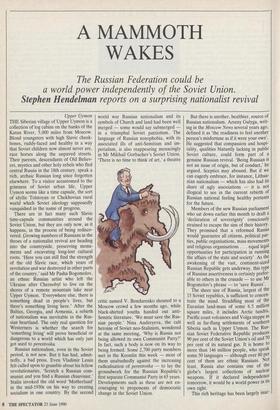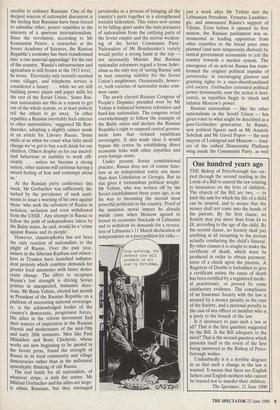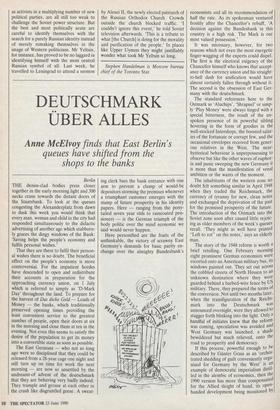A MAMMOTH WAKES
The Russian Federation could be a world power independently of the Soviet Union.
Stephen Hendelman reports on a surprising nationalist revival Upper Uymon THE Siberian village of Upper Uymon is a collection of log cabins on the banks of the Katun River, 5,000 miles from Moscow. Blond youngsters with high Slavic cheek- bones, ruddy-faced and healthy in a way that Soviet children now almost never are, race horses along the unpaved streets. Their parents, descendants of Old Believ- ers, mystics and other holy rebels who fled central Russia in the 18th century, speak a rich, archaic Russian long since forgotten elsewhere. To a visitor accustomed to the grimness of Soviet urban life, Upper Uymon seems like a time capsule, the sort of idyllic Tolstoyan or Chekhovian rural world which Soviet ideology supposedly vanquished in the name of progress.
There are in fact many such Slavic time-capsule communities around the Soviet Union, but they are only now, as it happens, in the process of being redisco- vered. growing numbers of Russians in the throes of a nationalist revival are heading into the countryside, preserving monu- ments and excavating long-lost cultural roots. 'Here you can still find the strength of the old Slavic race, which years of revolution and war destroyed in other parts of the country,' said Mr Pasha Bogomolov, an ethnic Russian artist who left the Ukraine after Chernobyl to live on the shores of a remote mountain lake near Upper Uymon. 'Everywhere else, there is something dead in people's lives, but there's something living here.' After the Baltics, Georgia, and Armenia, a rebirth of nationalism was inevitable in the Rus- sian heartland. The only real question for Westerners is whether the search for 'something living' will prove beneficial or dangerous to a world which has only just got used to perestroika.
Russian nationalism, even in the Soviet period, is not new. But it has had, admit- tedly, a bad press. Even Vladimir Lenin felt called upon to grumble about his fellow revolutionaries, 'Scratch a Russian com- munist and you find a Russian chauvinist.' Stalin invoked the old word 'Motherland' in the mid-1930s on his way to creating socialism in one country. By the second world war Russian nationalism and its symbols of Church and land had been well merged — some would say submerged in a triumphal Soviet patriotism. The language of Russian xenophobia, with its associated ills of anti-Semitism and im- perialism, is also reappearing menacingly in Mr Mikhail Gorbachev's Soviet Union. 'There is no time to think of art,' a theatre
critic named V. Bondarenko shouted to a Moscow crowd a few months ago, while black-shirted youths handed out anti- Semitic literature. 'We must save the Rus- sian people.' Nina Andreyeva, the cult heroine of Soviet neo-Stalinists, wondered at the same meeting, 'Why is Russia not being allowed its own Communist Party?' In fact, such a body is now on its way to being formed. Some 2,700 party members met in the Kremlin this week — most of them unabashedly against the increasing radicalisation of perestroika — to lay the groundwork for the Russian Republic's first separate Communist Party in 65 years. Developments such as these are not en- couraging to proponents of democratic change in the Soviet Union. But there is another, healthier, source of Russian nationalism. Arseny Gulyga, writ- ing in the Moscow News several years ago, defined it as 'the readiness to feel another person's misfortune as if it were your own'. He suggested that compassion and hospi- tality, qualities blatantly lacking in public Soviet culture, could form part of a genuine Russian revival. 'Being Russian is not an issue of origin, but of conduct,' he argued. Sceptics may abound. But if we can eagerly embrace, for instance, Lithua- nian nationalism — which has also had its share of ugly associations — it is not illogical to see in the current rebirth of Russian national feeling healthy portents for the future.
Members of the new Russian parliament who sat down earlier this month to draft a 'declaration of sovereignty' consciously strained to escape the sins of their history. They promised that a reformed Russia would 'guarantee all citizens, political par- ties, public organisations, mass movements and religious organisations . . . equal legal opportunities for participation in running the affairs of the state and society'. As the awakening of the vast, continent-sized Russian Republic gets underway, this type of Russian assertiveness is certainly prefer- able to others in the crusade — to use Mr Bogomolov's phrase — to 'save Russia'. The sheer size of Russia, largest of the 15 Soviet republics, is sufficient to concen- trate the mind. Straddling most of the Eurasian land-mass of some 6.5 million square miles, it includes Arctic tundra, Pacific coast volcanoes and Volga steppe as well as far-flung settlements of southern Siberia such as Upper Uymon. The Rus- sian Soviet Federative Republic produces 90 per cent of the Soviet Union's oil and 70 per cent of its natural gas. It is home to more than 146 million people, who speak some 50 languages — although over 80 per cent of them are ethnic Russians. Not least, Russia also contains one of the globe's largest collections of nuclear weapons. If it declared independence tomorrow, it would be a world power in its own right.
This rich heritage has been largely inac-
cessible to ordinary Russians. One of the deepest sources of nationalist discontent is the feeling that Russians have been forced to subsidise other, poorer republics in the interests of a spurious internationalism. Since the revolution, according to Mr Konstantin Petrov, a researcher at the Soviet Academy of Sciences, the Russian Republic's economy has been transformed into 'a raw material appendage' for the rest of the country. 'Russia's infrastructure and agriculture is still frozen at the 1913 level,' he wrote. 'Electricity only recently reached some villages, and telephone service is considered a luxury . . . while we are still building power plants and paper mills for the rest of the Soviet Union.' Some Rus- sian nationalists see this as a reason to get out of the whole system, or at least politely tell the others to go away. 'In other republics a Russian inevitably feels inferior to other nationalities,' suggested Mr Bon- darenko, adopting a slightly calmer mode in an article for Literary Russia. 'Some smile at us when we count what little small change we've got to buy a soft drink for our children. Others despise us for our uncivil- ised behaviour or inability to work effi- ciently . . . unless we become a strong nation, other nations will continue having a mixed feeling of fear and contempt about us.'
At the Russian party conference this week, Mr Gorbachev was sufficiently dis- turbed by the prevalence of such senti- ments to issue a warning of his own against those 'who seek the salvation of Russia in isolation, seclusion and even withdrawal from the USSR.' Any attempt in Russia to follow the path of independence taken by the Baltic states, he said, would be a 'crime against Russia and its people'.
However, claustrophobia has not been the only reaction of nationalists to the plight of Russia. Over the past year, miners in the Siberian Kuzbass and oilwor- kers in Tyumen have launched indepen- dent protests which combine demands for greater local autonomy with faster demo- cratic change. The effort to recapture Russia's lost strength is driving Soviet politics in unexpected, humanist direc- • tions. Mr Boris Yeltsin, elected last month as President of the Russian Republic on a platform of recovering national sovereign- ty, is the acknowledged leader of the country's democratic, progressive forces. His allies in the reform movement find their sources of inspiration in the Russian liberals and modernisers of the mid-19th and early 20th centuries. Men like Paul Miliukhov and Boris Chicherin, whose works are now beginning to be quoted in the Soviet press, found the strength of Russia in its local community and village democracies rather than in the millennial apocalyptic thinking of old Russia. The real battle for all nationalists, of whatever stripe, is with the centre. Mr Mikhail Gorbachev and his allies are large- ly ethnic Russians, but they envisaged perestroika as a process of bringing all the country's parts together in a strengthened socialist federation. This vision now seems to be falling apart under the twin pressures of nationalism from the outlying parts of the Soviet empire and the mortal weaken- ing of the Soviet Communist Party. Nationalists of Mr Bondarenko's variety would prefer a strong hand at the top not necessarily Marxist. But Russian nationalist reformers regard a loose feder- alism as the only way of 'saving Russia' and in turn ensuring stability for the Soviet Union's neighbours. Occasionally, howev- er, both varieties of nationalist make com- mon cause.
The newly elected Russian Congress of People's Deputies presided over by Mr Yeltsin is balanced between reformers and hard-line nationalists. The congress voted overwhelmingly to follow the example of the Baltic states and declare the Russian Republic's right to suspend central govern- ment laws that violated republican sovereignty. It also made clear it would bypass the centre by establishing direct economic links with other republics and even foreign states.
Under present Soviet constitutional practice, Russia does not of course func- tion as an independent entity any more than does Uzbekistan or Georgia. But its size gives it tremendous political weight. Mr Yeltsin, who was written off by the Soviet establishment three years ago, is on his way to becoming the second most powerful politician in the country. Proof of the immense moral impact he already wields came when Moscow agreed to loosen its economic blockade of Lithuania and to withdraw its demands for a revoca- tion of Lithuania's 11 March declaration of independence as a precondition for talks — just a week after Mr Yeltsin met the Lithuanian President, Vytautas Landsber- gis, and announced Russia's support of Vilnius. Even before it opened its first session, the Russian parliament was in- strumental in leading opposition from other republics to the bread price rises planned (and now temporarily shelved) by central government economists to jolt the country towards a market system. The emergence of an activist Russia has trans- formed the original political impulse of perestroika: in encouraging glasnost and granting rights to a once-disenfranchised civil society. Gorbachev extended political power downwards; now the action is hori- zontal, as republics begin to check and balance Moscow's power.
Russian nationalism — „like the other nationalisms in the Sovid Union — has given voice to what might be described as a post-Gorbachev generation. In Russia, new political figures such as Mr Anatoly Sobchak and Mr Gavril Popov — the new mayors of Leningrad and Moscow — lead- ers of the radical Democratic Platform wing inside the Communist Party, as well as activists in a multiplying number of new political parties, are all still too weak to challenge the Soviet power structure. But the best and most politically acute are careful to identify themselves with the search for a purely Russian identity instead of merely remaking themselves in the image of Western politicians. Mr Yeltsin, for instance, has proved to be no laggard in identifying himself with the most central Russian symbol of all. Last week, he travelled to Leningrad to attend a sermon by Alexei II, the newly elected patriarch of the Russian Orthodox Church. Crowds outside the church blocked traffic. 'I couldn't ignore this event,' he told Soviet television afterwards. 'This is a tribute to what [the Church] is doing for the morality and purification of the people.' In places like Upper Uymon they might justifiably wonder what took Mr Yeltsin so long.
Stephen Handelman is Moscow bureau chief of the Toronto Star.




















































 Previous page
Previous page